-
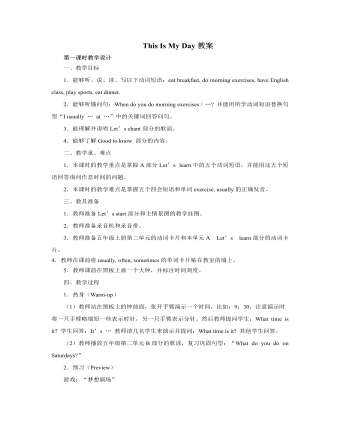
人教版新课标PEP小学英语五年级下册This Is My Day教案
学生初步了解对话内容,在描述中培养学生的语言运用能力。(2)教师让学生自己阅读本部分对话,不理解的生词和句子可以和同学或老师共同商讨。(3)教师帮助学生理解句子:“The weather report says it’s going to rain tomorrow. I can’t play football in the rain. I can’t go hiking, either. Let’s watch TV together.”出示图片:1) 晴天,Zoom在踢足球,图下显示:today;2)天在下雨,Zoom和Zip在屋里看电视,图下显示:tomorrow。与学生展开对话T:What’s the weather like today? S:It’s fine/ sunny. T:What does the weather report say about tomorrow?S:It’s going to rain.T:The weather report says it’s going to rain tomorrow.(呈现句子)(学生重复句子The weather report says it’s going to rain tomorrow.,并说出意思。)T:Can you play football in the rain?S:No,I can’t.T:Can you go hiking ?S:No,I can’t.T:In the rain, we can’t play football. We can’t go hiking, either. (呈现:either)学生跟读either,感悟单词的用法,教师讲解意思:(不......),也不...启发学生用either说两句话:In the rain, I can’t ... I can’t ..., either,从而在应用中巩固单词的读音和用法。
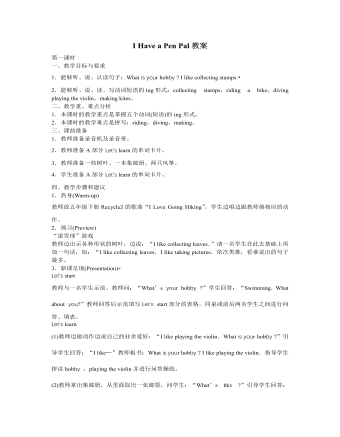
人教版新课标PEP小学英语六年级上册I Have a Pen Pal教案
(1)教师说:“Zhang Peng’s mother is a teacher.What does she teach? Does she teach English?”教师出示Let’s talk部分的挂图,放录音,学生听录音阅读对话。教师出示主句型:Does he/she…?Yes,he/she does.No,he/she doesn’t.然后教师引导学生回答刚刚提出的问题,逐步掌握肯定和否定回答。再放一遍, 学生跟读. (2)教师说:“My mother is a teacher,too.Do you want to know more about her.Ask me some questions.”教师依次出示B Let’s learn部分的单词卡片,提示学生根据上面的短语和黑板上的重点句型提问,教师作答。 (3)教师指导学生进行替换练习。必要时,提示学生可以换一下对话里的人物,f 如:Does your uncle live in the city? Yes,he does.Does your grandma live in the country? No,she doesn’t. (4)“寻找家园”游戏 教师准备一些卡片,正面写有人名,反面写有地名,如:city,country,village,farm,forest,mountain,nature park等。请一名学生上台抽取一张卡片,问台一学生:“Guess.Where does…live?’’学生猜:“Does he/she live in/on…?”猜对的小组得一分。

人教版新课标PEP小学英语六年级上册The Story of Rain教案
(2)教师说:“I am going to plant a flower on the weekend.But I don’t know hoⅥ do that.Can you tell me? Who knows?”教师提示学生可以适当用中文解释。如果有学生举手,教师就问:“OK.How d0 you do that?”引导学生回答。“First,put the seeds in the soil.”然后,教师接着说:“What should I do then? 引导学生回答“Water it. (3)教师说:“Zhang Peng is talking to h is teacher.Now Let’s see what they talking about.”学生翻开学生用书,教师放录音,学生跟读。教师解释In several days的意思是几天以后。”教师板书四会句型:How do you do that? What should you do then?学生仿写。 (4)同桌学生进行对话替换操练,可以谈论西瓜(watermelon)、小麦(wheat)等植物的种植过程。然后选几组在班上表演对话。 (5)教师指导学生运用主句型编对话。以下对话供参考: A:How do you clean the classroom? B:First.sweep the floor. A:What should you do after that? B:Then clean the desks and chairs.wash the windows. 4.巩固和延伸(Consolidation and extension) (1)做本单元B Let’s talk部分的活动手册配套练习。

人教版新课标PEP小学英语六年级上册What Are You Going to Do教案
1.热身(Warm-up) (1)全班一起吟唱Let’s chant的歌谣。 (2)单词拼写竞赛 要拼写的单词包括:this morning/afternoon/evening,next week,newspaper, postcard等。可采取小组合作的“接龙式”拼写形式;也可以选取组内一名学生拼写全部单词。拼出单词最快最多的组获胜。 (3)教师出示简明地图,师生问答如下: r:What shop is it? s:It’s a bookstore. r:What can you buy in the bookstore? s:… 在学生回答各商店所出售的物品时,教师根据其回答贴出物品的小卡片,如: Fruit stand:orange,apple,pear,banana….Shoe store:sneakers,sandals,boots….(此时可引导学生说“a pair of sneakers/boots’’等) 2.预习(Preview) Let’s try 教师指着地图中的商店及各商店所出售的物品说:Look!There are so many stores and so many goods.Let’s listen to the tape and find out:①Where is Sarah going? ②What is she going to buy? ③Who is she going with? 教师放三遍Let’s try部分的录音,以上问题可根据学生的实际情况分三次提出,直到多数学生能回答并能将前两项答案填人教师课前画出的表格中。在填表过程中,教师请学生一起拼写其中的四会单词,如:bookstore,comic book。
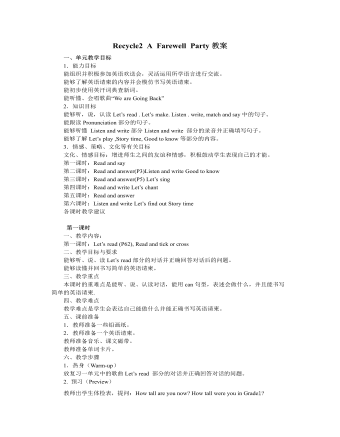
人教版新课标PEP小学英语六年级下册Recycle2 A Farewell Party教案
3. 新课呈现(Presentation) Let’s make (1)教师说:Miss White is making a book about her students. So she can remember them well.Who are the students? 请学生独立或分小组朗读四段短文,解释学生不理解的句子,然后说:There are four pictures below. Would you like to help Miss/White glue the pictures? 教师知道学生完成图文搭配的练习。 (2)教师发给每名学生一张铅画纸,说:Now please draw a picture of your best classmate. Then describe him or her.学生画一副最要好的同学的肖像,并在傍边配上对该同学的英语介绍。 学生上讲台介绍自己最要好的同学,请其他学生猜是谁,看谁说的生动又贴切,教师给予评价时注意强调第三人称单数形式的使用。 Story time 教师向学生展示Story time部分的教学挂图,指着最后一副图中的Zoom 和 Zip说 Look at the picture. Zoom and Zip are sad. They are saying goodbye to each other. Now let’s see What happened. 学生同桌之间合作阅读或是,然后教师提出问题Where is Zip going? Is this good news for zoom ? What grade is Zip going to be in? 教师放录音,学生录音跟读故事,然后再分角色朗读.

人教版新课标PEP小学英语六年级下册What’s the Matter, Mike教案
回答:She’s sad. She failed the math test.并板书:fail the math test。准备一张很糟的数学试卷,是学生了解语意。进一步教学其他短语a Chinese test, a English test,并 让学生了解pass the Chinese test, pass the English test, pass the math test. (4)教师请学生扮演Sarah,师生对话如下: T: Hello! Sarah, how are you? You look sad today. Sarah: Yes, I failed the math test. 教师接着说:I’m sorry to hear that.让学生理解意思。并引申出句子:I’m glad to hear that.让学生分角色朗读对话。 (5)Let’s check.让学生看Sarah的表情,并读两篇对话,选出正确的答案。 (6)活动名称:心理医生 活动目的:操练句型“How are you? You look…”.学生间自由组合编排对话.通过对话对学生展开情感教学,让学生理解健康的体魄和愉悦的心情的心情是一个人成功的重要因素,使学生形成良好的心理健康状态。 活动过程:A: How are you? You look bored today. B: Yes. I failed my math test. A: I’m sorry to hear that. Believe yourself. Work hard. You can pass the text next time. (7)活动名称:难忘时刻 活动目的:围绕照片上的表情展开询问和讨论.操练句型 “How do you feel? How does she/he feel?

人教版新目标初中英语七年级上册Can you play the guitar教案
本单元主要是学习情态动词can的肯定句、否定句、一般疑问句,肯定与否定回答,以及特殊疑问句的构成和用法;复习what弓!导的特殊疑问句。本单元主要围绕“加人俱乐部,谈论自己的能力”这一话题,设计了三个任务型活动:任务一是:自己的才艺表演,学习情态动词can的用法;任务二是:自己建立俱乐部,运用情态动词can谈论自己在某一方面的能力、喜好和意愿;任务三是:我能成功,主要是复习巩固谈论各自的爱好和特长的方法。单元知识系统(树)Can you/he/she/you dance? 一Yes,I/he/she/we can./No,I/he/she/we can’t.Can Bill play the guitar?一Yes,he can,but he can’t sing.单元总体目标通过学习情态动词can的用法,使学生能够表达自己在某一方面所具备的才能;能够谈论自己的喜好与意愿;能够为自己成立的各种俱乐部制作海报;会写招聘广告。单元重难点一览重点 难点I.复习词汇:can,play,want2.词汇:guitar, dance, swim,sing, chess, speak, drum,trumpet,violin,play the guitar3.句型:Can you/he/she/you dance?Yes,I/he/she/we can./No,I/he/she/we can’t.Can Bill play the guitar?

人教版新目标初中英语七年级上册Do you have a soccer ball教案
在这一单元中,学生要学会就有关人与物之间所属关系进行问答的句子。本单元大量引入有关运动的名词,要求学生彼此询问有无此类物品,并做出相应的回答。 同时学习表示建议的句型Let’s运动的形容词。 本单元所选用的话题来自学生所喜欢的生活片段,在教学中生生交流、师生交流会更融洽,会促进师生彼此间的了解,成功的教学还会让部分学生养成良好的运动习惯和收藏习惯。 教学目标 1) 语言知识:A.在询问对方是否有某物的对话中学会使用do和does引导的一般疑问句; B. 学会使用描述性的形容词来评价事物; C. 学会在对话中使用名词复数; D. 学会用祈使句来向对方提出建议. 2) 语言技能:A. 学会用祈使句询问某人是否有某物; B. 学会向他人提出建议的句子. 3) 学习策略:A.通过与同学讨论,做出猜测;

人教版新目标初中英语七年级上册Do you want to go to a movie教案
讨论喜欢的影视类型及理由:在看过一部影视作品后,大家总是喜欢在一起谈论影视的主要内容、主要情节、主要演员主题歌曲、主题音乐等,互相介绍自己对该影视的看法。教师可以组织一次活动,分组讨论学生喜欢看什么类型的电影,并说明喜欢的理由。运用I like…I don’t like…Because it is…等语言结构;然后每个组选派一名代表向全班学生阐述本组组员喜欢观看的电影类型;最后汇总,总结出全班同学最喜欢观看哪一种类型的电影。如果有可能,根据学生的选择放一部(一段)这种类型的影视节目。通过学生的讨论、调查,使他们在完成任务的过程中学会询问和陈述自己或别人在影视方面的喜好及理由,更好地巩固所学内容。Self Check教学内容Self Check(教材P58)教学目标知识与能力复习词汇go,movie,action,comedy,documentary,thriller,and,but,scary,funny, sad,exciting;引导学生复习、巩固“制订计划和打算并谈论喜好和偏爱”的目标语言。
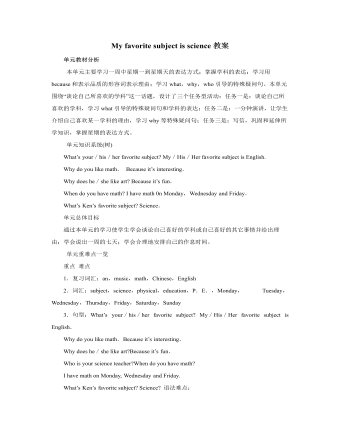
人教版新目标初中英语七年级上册My favorite subject is science教案
本单元主要学习一周中星期一到星期天的表达方式;掌握学科的表达;学习用because和表示品质的形容词表示理由;学习what,why,who引导的特殊疑问句。本单元围绕“谈论自己所喜欢的学科”这一话题,设计了三个任务型活动:任务一是:谈论自己所喜欢的学科,学习what引导的特殊疑问句和学科的表达;任务二是:一分钟演讲,让学生介绍自己喜欢某一学科的理由,学习why等特殊疑问句;任务三是:写信,巩固和延伸所学知识,掌握星期的表达方式。单元知识系统(树)What’s your/his/her favorite subject? My/His/Her favorite subject is English.Why do you like math. Because it’s interesting.Why does he/she like art? Because it’s fun.When do you have math? I have math 0n Monday,Wednesday and Friday.What’s Ken’s favorite subject? Science.单元总体目标通过本单元的学习使学生学会谈论自己喜好的学科或自己喜好的其它事情并给出理由;学会说出一周的七天;学会合理地安排自己的作息时间。

人教版新目标初中英语七年级下册How was your weekend教案2篇
Teaching Goal:1. General aims:Talk about recent past events2. Particular aims:A. Language Focus.Talk about recent past events and think of the past events.B. Language goalsHow was….?It was …What did …do over the weekend?C. Language structures:(1). How was your weekend? I was great. Pay attention to no form.(2). What did you do over the weekend? I played soccer. We went to the beach.D. Useful words and phrases:Words: was, did, went, beach, over, project, test, wasn’t, false, number, geography, spend, week, most, mixture, their, had, little, cook, read, saw, change, everyone, sit, sat, no, anythingPhrases: did one’s homework, played soccer, cleaned my room, went to the beach, played tennis, went to the movies, on Saturday morning, over the weekend, cook … for, what about, do some reading, have a party, talk show, go shoppingE. Grammar language:Present simple past tenseRegular and irregular verbsF. Learning strategies:Tour and holidaysG. Interdiscipinary:H. Emotion and manner:Teaching time: 5 periodsTeaching procedures:Period One教学步骤、时间 教师活动 学生活动 媒体应用Step 1Free talk 3’ Ask some questions like:Who’s on duty today?What’s the weather like? Answer and talk about something.让同学们回答下列问题1. Do you like weekend? (Let some students answer)It takes them three minutes to talk about the question.2. Why do you like weekend? (let the students answer) Most of the students like the weekend此时教师用汉语问:“在周末期间问你干了什么?这句话用英语这么回答?Let the students guess.At last the teacher give them right answer3. What did you do over the weekend?(板书、学习)

人教版新目标初中英语七年级上册What time do you go to school教案
知识与能力复习词汇time,morning,breakfast,get up,g0 t0 bed,homework,clock,afternoon,lunch,run,watch TV,evening,dinner,eat,usually,o’clock,thirty,fifteen,take a shower,go t0 school等;引导学生复习、巩固“询问和谈论时间”的目标语言并运用所学知识安排自己的学习和课外活动。过程与方法运用Summarizing,Classifying和Comparing的学习策略。在复习教学中,运用听写、提问、对话演练与调查活动,促使学生不断地使用所学内容,从而提高他们灵活运用知识的能力。情感态度价值观本部分的主要内容是复习“日常作息时间”的询问和表达。通过互相询问或谈论自己或对方的作息时间安排和活动计划,培养学生良好的作息习惯和守时习惯。教学重、难点及教学突破重点复习词汇time,morning,breakfast,get up,g0 to bed,homework,clock,afternoon,lunch,run,watch TV,evening,dinner,eat,usually,o’clock,thirty,fifteen,take a shower,go to school等;引导学生复习、巩固“询问和谈论时间”的目标语言。

人教版新目标初中英语七年级下册Where is the post office教案2篇
Period 2 (3a----Section B 2c)Preview(Pre-task): Key points: What laAdd another information about their pen pals----their language on the cardnguage does she/he speak?She/He speaks....Does she/he have any brothers and sisters? Does she/he speak English?Preview(Pre-task): Add another information about their pen pals----their language on the cardKey points: What language does she/he speak?She/He speaks....Does she/he have any brothers and sisters? Does she/he speak English?Step 1 Revision1.Revisionand dictation of the new words 2.Revise the drills they learned yesterday.(by pairwork and grammar exercise)Step 2 Leading-inT has a conversation with one student. The conversation is following:---Do you have a pen pal?---Yes, I do.---What's your pen pal's name? ---His/Her name is....---Where is your pen pal from? ---He/She is from...---Where does he/she live? ---He/She lives in....---What language does he/she speak?He/She speaks...Write the new words on the Bb. They are following: EnglishChineseJapaneseFrenchStep 3 LearnLearn the new words with the whole class.Finish 3a with the students3b Pairwork T still does an example with one student Then the Ss practise in pairs. The example is following:--Curry Muray is my pen pal. He is from the United States.---What language does he speak?

人教版新目标初中英语七年级上册What’s this in English教案
一、知识和能力目标本单元的核心教学内容是“认物”。用英语确认周围的常见事物比较符合英语初学者的实际情况。通过本单元教学,使学生运用所学句型,去熟悉周围事物的名称;教学生学会在实际生活中如何确认事物。通过辨认物体,学生学到一些生词,并巩固所学句型。二、过程和方法目标教师要尽量使学生对课文中出现的句型能够熟练上口,这样,学生才能顺利开展比较灵活的对话。教师可以用手势,表情,动作等示意,帮助学生听懂课堂教学内容,但在实际操作中应尽量避免“明知故问”的倾向,应该采用应用性原则;如:遮盖物品、显露局部、辨认物体、完形识别、图形辨认等方法。三、情感态度和价值观目标目标在学生学习过程中的作用至关重要,教师要帮助他们建立起一个切合自己实际的目标,通过渐进的学习以及一点一滴的进步,使他们逐步建立起成功感。成功越多,自信心就越强。

人教版新目标初中英语七年级下册Don’t eat in class教案2篇
Don’t fight. =You can’t fight. (板书,教读)教师把这些句子板书在黑板上,并请学生大声整齐地读祈使句和“can’t”句型,并让学生注意两种句型表达形式的不同和转换,“Don’t …=You can’t…”;并对学生说:These are our school rules. (板书,教读) You can’t break the school rules. Don’t break the school rules.(板书,教读)步骤3 :Practicea. T: Now, each of the students is breaking one of these rules.Please finish 1a.学生看图,完成1a的内容,检查答案并大声朗读校规。b. 听录音,完成1b,选出四位学生都违反了哪条校规;听之前,学生要读会英文名。c. 请两位学生朗读1c部分的句型;要求学生两人一组对话表演,SA扮演外校转来新生,SB告知本校校规。(学生可经过讨论,多说出他们想到的校规,不必只限于书上;教师应给予帮助)2) 第二课时(2a~4)步骤1 :warming up of revisionT: What are the rules at your school?学生使用“can”或祈使句表达各条校规;其中老师可引出“eat in the cafeteria outside”的表达。步骤2 :Practicea.T: Christina is an exchange student. She doesn’t know the rules. Let’s listen, what activities they’re talking about?学生听第一遍时,完成2a;第二遍时,完成2b;b. 请学生领读2c部分,看着2a完成的表格,理解2c活动的要求;分成小组针对2a进行问答;

人教版新目标初中英语七年级下册I want to be an actor教案2篇
三、教学建议第一课时:1. Lead in (Vocabulary)A) Before class, teacher should collect some pictures of working places. For example: Bank, TV Station, Restaurant, Police Station, Hospital ...B) In class, show students the pictures (PowerPoint, OHP). Ask students to tell the name of the working places and the name of the jobs.Shop assistant, doctor, actor, reporter, police office, waiter, bank clerk, studentC) Do exercise 1a and 3a.2. Bingo GameAsk groups of students to make up pairs of cards with a job on one and the related workplace on the other. For example, waiter / restaurant, teacher / school, doctor / hospital. Encourage students to use both the job / workplace combinations in the book and the ones that students came up during class discussions. Be sure they have twice as many sets of cards as there are students in the group. They can make two sets of cards for a single job / workplace, if necessary. Then have each group mix up its set of cards and hand their cards out in random order. Each time a student gets a pair of cards that match, he or she can lay these cards down. The goal is to have no cards in your hand at the end.3. Task OneA) Ask students to work in pairs and ask the partner what does he / she want to be in the future.e. g. :What do you / does he / does she want to be?I want to be a.Why?Because it's (adj).B) Vocabulary: Section B, 1a4. Homework 1.2.
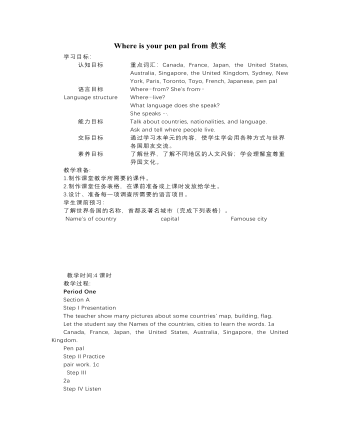
人教版新目标初中英语七年级下册Where is your pen pal from教案
2.1Match the country with the language.Step II Reading3a? let the students read the letter fast and answer the questions.? Let the students ask more questions about the letter as possible as the can.Step III Writing3b.Step IV. Pairwork2cStep V Listening2a, 2bStep V. HomeworkExercises book(1) P3Exercises book (2) P3Period FourStep I . Dictate the words and sentences in Unit1.Step II. Self-checkStep III. Check the answers for Exercises book in the unit.Step IV. Home workRevise and preparation for unit 2.教学反思:通过本单元的学习,学生基本可以谈论人们的国籍,居住城市及其所说的语言,通过书信方式去介绍自己并寻找笔友。但在涉及到国外的一些城市时,学生对这方面的知识相对欠缺,能介绍的城市并不多,也反应出学生课前预习不充分,这跟学生学习条件也有关,大多数学生无法通过网络获取所需信息。因此,在以后的教学中要多指导学生通过计算机网络获取信息,拓宽知识面。
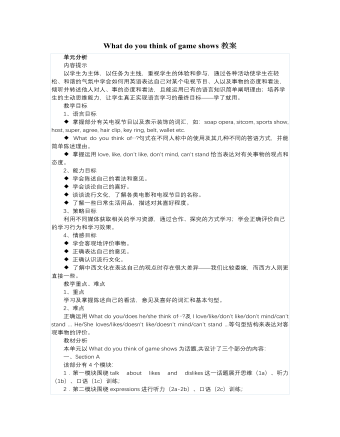
人教版新目标初中英语七年级下册What do you think of game shows教案
五、教学Section B-2c1. Pair work: What do you think of the belt/sunglasses/…? What does your father/mother/… think of your scarf/belt…?2. Group work(1). Teacher shows some different kinds of school uniforms (制服)and asks : “ What do you think of your school uniforms? If you have a chance to choose your school uniforms, what kind would you like to choose?”(2). Discuss in groups.(3).Get some Ss to report in class.说明:这一步旨在让学生运用已有的语言知识谈论对事物的看法和意见,并简单阐明理由,培养学生的主动思维能力和运用英语的能力。六、教学拓展调查电视节目的收视率任务:调查你周围的人对现在各种电视节目的反响。活动过程:1.教师布置任务,让学生调查周围的人(包括他的亲戚朋友和邻居)喜欢收看哪方面的电视节目。2.学生进行调查活动,运用本单元所学的句型What do you think of….? (Why?)What's your favorite game shows?What do you think of talk show?I doesn’t mind it.I like it.I love it.I can’t stand it.3.记录下排在前10位的TV Program,填写调查表,比较其收视率。

人教版新目标初中英语七年级下册Why do you like koalas教案2篇
单元整体说明(一)单元教材分析本单元的核心话题是描述动物和表达个人喜好,以及句式why do you like…? Because…。这也是本单元的教学重点。通过本单元的学习,学生应能较流利地运用所学词汇和句型描述动物,表达个人喜好。(二)单元知识结构1.词汇动物名称 tiger, elephant, koala, dolphin, etc.词汇描述性形容词: smart, cute, ugly, clever, shy, etc.国家名: Australia, South Africa2.句型Why do you like koala hears? Because they are cute.Where are pandas from? They're from China.What animals do you like? I like dolphins.(三)单元整体目标1.Master the vocabulary2.Master and use: Why do you like koalas? Because they am cute.Where are pandas from? They're from China.What animals do you like? I like dolphins.(四)单元教学重难点一览(五)单元学情分析学生此前已经学过由why, where, what 引导的特殊疑问句句型,具有了学习本单元知识的认知前提。形形色色的动物能激发学生的好奇心,产生了解它们的欲望,这有利于本单元知识的教学和学生学习兴趣的培养。

人教版新目标初中英语八年级上册Can you come to my party教案3篇
Step 3 (3b)First, tell the students when we talk about our future plans, we often use: I’m+verb+ing When we talk about what we must do, we use have to. Ask the students to fill in the blanks in 3b. The answers are: shopping, go to see, a test, I’m going, my family. Step 4 (3c)Let the students write an e-mail message to a friend. Say why you can’t visit next. Before the exercise, ask the students to give some possible answers and write them on the blackboard. So the students will feel easy to finish the writing exercise. After they finish it, Let them to correct it in groups first. Each group chooses theirs best one to read in front of the whole class. Step 5 ( planning a party )First read the conversation in the box together. Then ask the students to turn to page 88.Write down everything you have to do next week. Write in all the things you have to do . Ask the students to look at the list. Ask them “What day are you free?” This is when you can have your party. Step 6 (Self check 1 )Let the students to fill in the blanks with the words given. Change the forms of the words if possible. Then make their own sentences. The answers are: visit, playing, have to, study, comeStep 7 (Self check 2)Imagine you are Marie. Read the information and look at your schedule. Write replies to the invitation.

